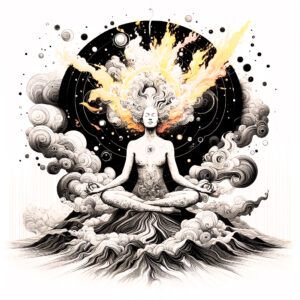
CONCEPT:
Shadow Masculine
Pronunciation:
\ˈsha-dō ˈmas-kyə-lən\
Definition:
The Shadow Masculine is a concept in Jungian psychology referring to the repressed or disowned aspects of the masculine psyche. It encompasses the darker, more primal, and often feared aspects of masculinity, such as aggression, violence, dominance, and emotional suppression.
Other Concepts
Deeper Understanding
In the realm of Jungian psychology, the Shadow Masculine emerges as a formidable force demanding recognition and understanding. This concept, integral to grasping the full spectrum of the masculine psyche, delves into the recesses where society’s light rarely penetrates. Carl Jung, the eminent Swiss psychiatrist, developed the notion of the shadow to describe the unconscious parts of ourselves that we reject or fail to acknowledge. This shadow encompasses both masculine and feminine dimensions, with the Shadow Masculine specifically addressing the suppressed elements of the masculine.
The Shadow Masculine is not inherently negative. It embodies a range of emotions and traits essential for psychological wholeness. These darker aspects—aggression, violence, dominance, and emotional suppression—are often labeled as undesirable, yet they are fundamental to the human experience. When these elements remain unintegrated, they can manifest in destructive behaviors, toxic masculinity, and unhealthy power dynamics, causing turmoil both internally and externally.
Historical and cultural contexts have significantly influenced the perception and suppression of the masculine shadow. For centuries, patriarchal structures have dictated the roles and acceptable behaviors for men, relegating more vulnerable, compassionate, and emotionally expressive traits to the shadows. Jungian analysts and scholars in men’s studies have explored these dynamics extensively, highlighting the cultural pressures and expectations placed on men to conform to narrow definitions of masculinity. Texts like Iron John: A Book About Men by Robert Bly delve into these shadow aspects, offering pathways to understanding and integration.
When men lose touch with their true essence, they shift from acting from a centered state of being to reacting from a place of disarray. In this state, men may become aggressive, controlling, numb, abusive, ruthless, dominating, persecutory, cold, detached, and egotistical. This disconnection from the true self results in destructive behaviors and relationships, often rooted in unacknowledged pain and fear. This phenomenon is often linked to the forgetting or neglecting of the Divine Feminine. Without the balance provided by the feminine principle, the Shadow Masculine’s traits can become exaggerated and maladaptive.
Conversely, when individuals lose touch with their true essence and the Divine Feminine, they shift from operating from a centered being to a reactive state. This leads to feelings of victimization, entrapment, dependency, insecurity, manipulation, passivity, over-emotionality, reluctant acquiescence, inauthenticity, and bitterness. The suppression of the feminine can activate the Shadow Masculine, exacerbating aggressive, controlling, and detached behaviors.
Understanding the Shadow Masculine aligns with broader psychological research on the unconscious mind and repression. Studies suggest that integrating these repressed aspects is crucial for psychological health. Bringing the Shadow Masculine into consciousness allows for a more holistic self-understanding, facilitating personal growth and emotional resilience. It challenges traditional dichotomies of strength and vulnerability, presenting a more complex and authentic view of the masculine psyche.
In contemporary society, the relevance of the Shadow Masculine cannot be overstated. As men navigate the intricate landscape of modern life, confronting and embracing these shadow aspects becomes a form of empowerment. It allows men to reclaim parts of themselves that have been marginalized, fostering a fuller expression of their identities. This process is not just personal but also cultural, as it challenges the patriarchal norms that have long suppressed the full range of masculine expression.
Understanding the Shadow Masculine also has significant implications for mental health and interpersonal relationships. By integrating these shadow elements, individuals can achieve greater emotional balance and authenticity in their interactions. It fosters empathy and compassion, as recognizing one’s shadow facilitates a deeper understanding of others’ struggles with their shadows.
In conclusion, the Shadow Masculine represents a critical aspect of the masculine psyche that, when acknowledged and integrated, can lead to profound personal and cultural transformation. Rooted in Jungian psychology, it offers a pathway to wholeness, challenging the patriarchal suppression of masculine power and advocating for a more inclusive understanding of the human experience.
References
Bly, Robert. Iron John: A Book About Men. Addison-Wesley, 1990.
Zweig, Connie, and Jeremiah Abrams, eds. Meeting the Shadow: The Hidden Power of the Dark Side of Human Nature. TarcherPerigee, 1991.

